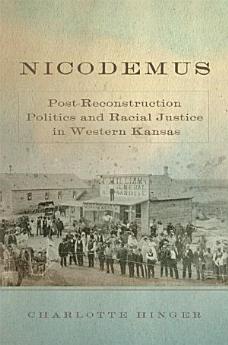Nicodemus: Post-Reconstruction Politics and Racial Justice in Western Kansas
May 2016 · Race and Culture in the American West Series Book 11 · University of Oklahoma Press
Ebook
284
Pages
reportRatings and reviews aren’t verified Learn More
About this ebook
Pushed out of the South as Reconstruction ended and as white landowners, employers, and “Redeemer” governments sought to reestablish the constraints of slavery, thousands of African Americans migrated west in search of better opportunities. As the first well-known all-black community on the plains, Nicodemus, Kansas, became a national exemplar of black self-improvement. But Nicodemus also embodied many of the problems facing African Americans during this time. Diverging philosophies within the community, Charlotte Hinger argues, foretold the differences that continue to divide black politicians and intellectuals today.
At the time Nicodemus was founded, politicians underestimated the power of African American voters. But three of the town’s black homesteaders—Abram Thompson Hall, Jr., Edward Preston McCabe, and John W. Niles—exerted extraordinary influence over county, state, and national politics. Hinger examines their divergent strategies for leading their community and for relating to white people, which reflected emerging black worldviews across the United States as African Americans grappled with the responsibilities accompanying their new freedom. Hall supported racial uplift, McCabe insisted on achieving equality through politics and legislation, and Niles advocated reparations for slavery. Hall and McCabe, both northerners, had distinguished educations, while Niles, a former slave, was a gifted orator. Their differing approaches to creating a new civilization on the prairie, seeking justice for blacks, and improving the situation of Nicodemus citizens roiled Kansas politics, already in turmoil over temperance and woman’s suffrage.
Nicodemus was a microcosm of all the issues facing black Americans in the late nineteenth century, and Hall, McCabe, and Niles are archetypes for powerful philosophies that have persisted into the twenty-first century. This study of their ideas and the ways they shaped Nicodemus offers a novel perspective on the most famous post–Civil War African American community in the West.
About the author
Award-winning novelist and independent historian Charlotte Hinger is the author of several articles and encyclopedia entries on African American history in the West and the novels Come Spring, Deadly Descent, Lethal Lineage, and Hidden Heritage.
Rate this ebook
Tell us what you think.
Reading information
Smartphones and tablets
Install the Google Play Books app for Android and iPad/iPhone. It syncs automatically with your account and allows you to read online or offline wherever you are.
Laptops and computers
You can listen to audiobooks purchased on Google Play using your computer's web browser.
eReaders and other devices
To read on e-ink devices like Kobo eReaders, you'll need to download a file and transfer it to your device. Follow the detailed Help Center instructions to transfer the files to supported eReaders.











